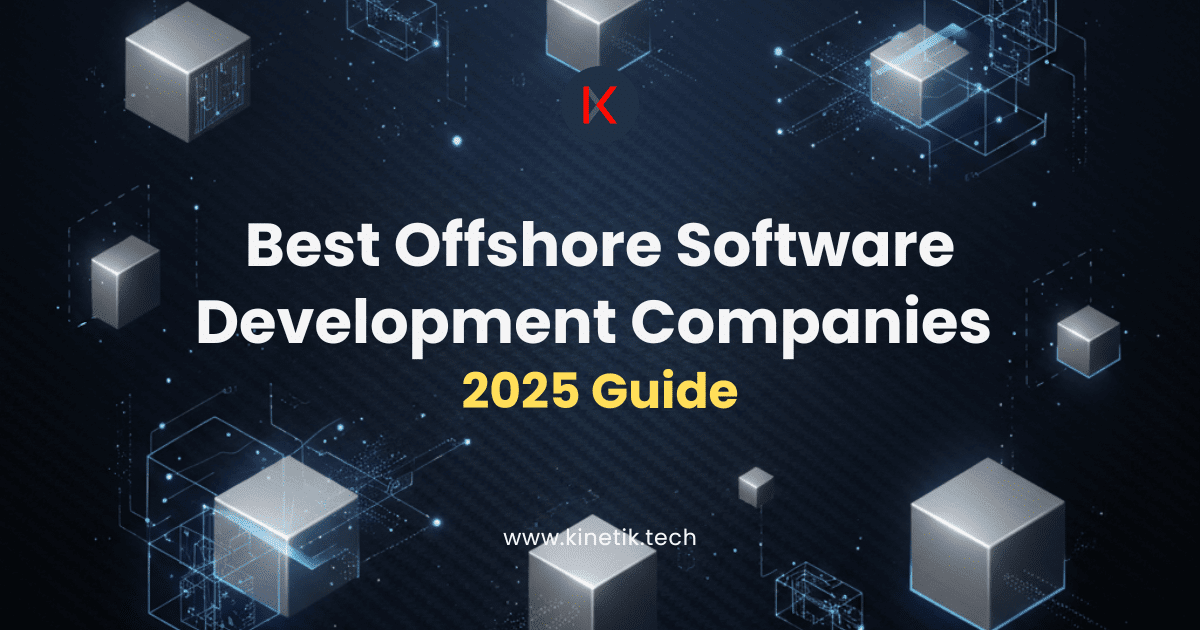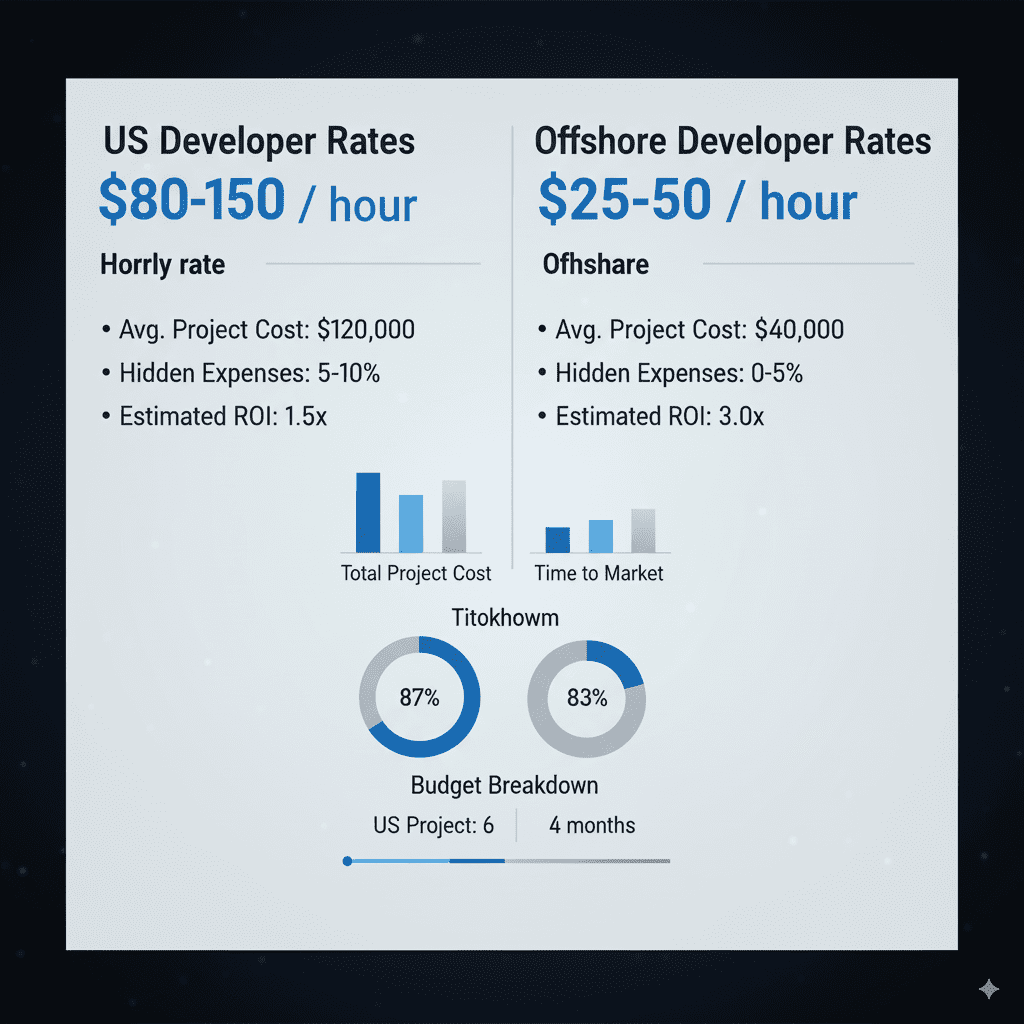Key Takeaways
- Market growth acceleration shows offshore software development reaching $413 billion by 2033 with 11.04% CAGR, making it essential for competitive businesses
- Cost optimization strategies deliver 40-70% savings compared to US development teams while maintaining enterprise-grade quality and security standards
- Quality differentiation factors separate top offshore development companies through proven methodologies, communication excellence, and cultural alignment practices
- Risk mitigation frameworks from leading offshore partners include IP protection, data security, and business continuity planning that exceed industry standards
- Strategic partnership benefits extend beyond cost savings to include 24/7 development cycles, global talent access, and rapid scalability for growing businesses
The $2.1 million mistake that transformed how Fortune 500 companies choose offshore partners. A major US retailer hired the cheapest offshore development company they could find, attracted by rock-bottom rates and promises of quick delivery. Eighteen months later, they faced a complete system rebuild, security breaches, and regulatory compliance failures.
This disaster led them to discover what separates the best offshore software development companies from the rest: proven processes, transparent communication, and unwavering commitment to quality. Today, they work exclusively with top-tier offshore partners and have saved over $15 million while accelerating innovation.

The offshore development landscape has evolved dramatically. According to Statista’s offshore development research, the global offshore software development market is projected to reach $413 billion by 2033 with a CAGR of 11.04%, driven by businesses discovering that strategic offshore partnerships provide competitive advantages far beyond cost savings.
The New Reality: Why Smart Companies Choose Offshore Development
The question isn’t whether to use offshore development—it’s how to choose the right partner. Cost efficiency remains a primary driver, with enterprise resource planning (ERP) software leading as the largest revenue generator in offshore development, but successful companies focus on value creation rather than cost cutting alone.
The best offshore software development companies have fundamentally changed the risk-reward equation. They provide:
Strategic Advantages:
- Access to global talent pools with specialized expertise
- 24/7 development cycles through time zone optimization
- Rapid scalability without local recruitment constraints
- Cost efficiency enabling reinvestment in innovation
Quality Assurance: Top offshore partners now match or exceed US quality standards through rigorous processes, automated testing, and continuous improvement methodologies.
Cultural Integration: Leading offshore companies invest heavily in US business culture training, communication protocols, and collaborative tools that eliminate traditional offshore friction.
What Makes the Best Offshore Software Development Companies Different
1. Proven Track Record with Measurable Results
The best offshore software development companies don’t just promise savings—they deliver documented results with specific metrics and client testimonials.
Quality Indicators to Evaluate:
- Client retention rates above 90%
- On-time delivery rates exceeding 95%
- Post-launch bug rates below industry standards
- Security incident rates approaching zero
- Reference clients willing to provide detailed feedback
Red Flags to Avoid:
- Vague promises without specific metrics
- Reluctance to provide recent client references
- Lack of industry-specific experience
- Unclear communication about processes and methodologies
- Pricing that seems too good to be true
2. Industry-Specific Expertise and Compliance
Top offshore development companies specialize in specific industries and understand regulatory requirements that generic providers miss.
FinTech Excellence: The best partners understand FINRA compliance, PCI DSS requirements, and banking security standards that prevent costly regulatory violations.
Healthcare Specialization: Leading offshore companies provide HIPAA-compliant development, FDA documentation support, and medical device integration expertise.
E-commerce Mastery: Top partners deliver scalable architecture, payment processing integration, and performance optimization for high-traffic retail platforms.
Enterprise Solutions: The best offshore companies handle complex enterprise integrations, legacy system modernization, and corporate security requirements.
3. Communication and Cultural Alignment Excellence
Communication failures kill more offshore projects than technical issues. The best offshore software development companies invest heavily in eliminating cultural and communication barriers.
Communication Infrastructure:
- Dedicated project managers with US business experience
- Real-time collaboration tools and shared development environments
- Structured reporting with transparent progress tracking
- Regular stakeholder meetings with clear agendas and outcomes
Cultural Integration:
- US business culture training for entire teams
- Understanding of American communication styles and expectations
- Alignment with US business hours for real-time collaboration
- Appreciation for deadlines, quality standards, and customer service excellence
4. Security and Intellectual Property Protection
Data security and IP protection are non-negotiable requirements when evaluating offshore partners.
Essential Security Measures:
- SOC 2 Type II compliance with annual audits
- ISO 27001 certification for information security management
- Comprehensive NDAs with legal enforcement mechanisms
- Secure development environments with restricted access
- Regular security assessments and penetration testing
IP Protection Standards:
- Clear code ownership agreements
- Secure code repositories with access controls
- Employee confidentiality agreements
- Data handling procedures meeting GDPR requirements
- Insurance coverage for IP theft and data breaches
Top Offshore Development Destinations: Strategic Analysis

Eastern Europe: Quality and Cultural Proximity
Advantages: Strong technical education systems, cultural alignment with Western business practices, excellent English proficiency, and time zone compatibility with US East Coast.
Key Markets: Ukraine, Poland, Romania, Czech Republic Specializations: Enterprise software, fintech solutions, complex system integrations Cost Range: $25-50/hour for senior developers
South Asia: Scale and Cost Efficiency
Advantages: Large talent pools, established infrastructure, significant cost savings, and mature outsourcing industry with proven processes.
Key Markets: India, Bangladesh, Pakistan, Sri Lanka Specializations: Custom software development, mobile applications, web platforms, AI/ML solutions Cost Range: $15-35/hour for senior developers
Latin America: Nearshore Benefits
Advantages: The Latin American market is projected to grow at a CAGR of 12.7% from 2025 to 2030, offering minimal time zone differences, cultural similarities, and strong English proficiency.
Key Markets: Mexico, Argentina, Brazil, Colombia Specializations: Web development, mobile apps, e-commerce platforms Cost Range: $20-40/hour for senior developers
Southeast Asia: Emerging Excellence
Advantages: Growing tech ecosystems, competitive costs, government support for technology sector development, and increasing English proficiency.
Key Markets: Vietnam, Philippines, Thailand, Malaysia Specializations: Web development, mobile applications, software testing Cost Range: $12-25/hour for senior developers
Evaluation Framework: Choosing the Right Offshore Partner
Technical Assessment Criteria
Development Methodology: Evaluate whether the offshore company follows proven methodologies like Agile, Scrum, or DevOps practices with documented processes and quality gates.
Technology Stack Expertise: Assess experience with your required technologies, frameworks, and platforms through portfolio review and technical discussions.
Quality Assurance Processes: Review testing methodologies, automated testing capabilities, performance optimization practices, and bug tracking systems.
Scalability Planning: Understand how the company handles team scaling, resource allocation, and knowledge transfer when project requirements change.
Business Evaluation Factors
Financial Stability: Evaluate company financials, client diversity, revenue growth, and business continuity planning to ensure long-term partnership viability.
Communication Infrastructure: Assess project management tools, reporting systems, meeting cadences, and escalation procedures for issue resolution.
Legal and Compliance: Review contract terms, IP protection measures, data security protocols, and regulatory compliance capabilities.
Cultural Fit: Evaluate alignment with your business culture, communication styles, work ethics, and collaborative approaches.
Cost-Benefit Analysis: Understanding True ROI

Direct Cost Comparisons
US Development Costs:
- Senior Developer: $80-150/hour
- Project Manager: $60-100/hour
- QA Engineer: $50-80/hour
- DevOps Specialist: $70-120/hour
Offshore Development Costs (Top Tier Companies):
- Senior Developer: $25-50/hour
- Project Manager: $20-40/hour
- QA Engineer: $15-30/hour
- DevOps Specialist: $25-45/hour
Potential Savings: 40-60% reduction in direct development costs
Hidden Cost Considerations
Management Overhead: Factor 10-20% additional management time for communication coordination and progress monitoring.
Quality Assurance: Budget for additional testing and review cycles, especially during initial projects with new offshore partners.
Knowledge Transfer: Include time and costs for documenting requirements, sharing domain knowledge, and training offshore teams.
Travel and Communication: Consider occasional on-site visits, time zone coordination costs, and communication tool subscriptions.
ROI Optimization Strategies
Start with Pilot Projects: Begin with smaller, non-critical projects to evaluate partnership effectiveness before committing to major initiatives.
Invest in Relationship Building: Allocate time and resources for team building, cultural exchange, and process optimization during initial phases.
Focus on Long-term Partnerships: The best ROI comes from sustained relationships where offshore teams become deeply familiar with your business.
Continuous Improvement: Regular feedback sessions, process refinement, and partnership optimization maximize long-term value creation.
Risk Mitigation Strategies for Offshore Development
Common Risks and Prevention Measures
Communication Breakdowns:
- Prevention: Establish clear communication protocols, regular check-ins, and escalation procedures
- Mitigation: Use collaborative tools, document all decisions, and maintain multiple communication channels
Quality Issues:
- Prevention: Define clear quality standards, implement code review processes, and establish testing protocols
- Mitigation: Regular quality audits, automated testing pipelines, and continuous improvement feedback loops
Timeline Delays:
- Prevention: Realistic project planning, buffer time allocation, and milestone-based progress tracking
- Mitigation: Flexible resource allocation, priority adjustment capabilities, and alternative delivery options
Security Breaches:
- Prevention: Comprehensive security assessments, secure development environments, and regular security training
- Mitigation: Incident response plans, insurance coverage, and rapid containment procedures
Legal and Contractual Protection
Comprehensive Contracts: Include detailed scope definitions, quality standards, delivery timelines, and penalty clauses for non-performance.
IP Protection Agreements: Clear ownership definitions, confidentiality requirements, and legal enforcement mechanisms.
Data Security Clauses: Specific requirements for data handling, storage, transmission, and disposal with audit rights and compliance verification.
Termination Procedures: Defined processes for contract termination, knowledge transfer, and asset return with minimal business disruption.
Success Stories: Offshore Development Excellence
FinTech Platform Transformation
Challenge: A US trading platform needed regulatory-compliant system modernization with strict security requirements and tight deadlines.
Solution: Partnership with specialized offshore fintech development company providing dedicated compliance expertise and security-first development practices.
Results:
- 50% cost savings compared to US-based alternatives
- 100% regulatory compliance achievement
- 6-month faster time-to-market
- Zero security incidents over 2 years of operation
Key Success Factors: Industry specialization, regulatory expertise, and proven security frameworks.
Healthcare Innovation Acceleration
Challenge: Medical device manufacturer required FDA-compliant software with complex integration requirements and strict quality standards.
Solution: Offshore partner with healthcare specialization, FDA documentation experience, and medical device integration capabilities.
Results:
- 40% development cost reduction
- FDA approval achieved on first submission
- 30% faster development cycle
- 100% HIPAA compliance maintained
Key Success Factors: Healthcare domain expertise, regulatory knowledge, and quality-first development approach.
E-commerce Scalability Success
Challenge: Rapidly growing e-commerce platform needed infrastructure capable of handling 10x traffic growth with 99.9% uptime requirements.
Solution: Offshore development team specializing in scalable architecture, performance optimization, and cloud-native solutions.
Results:
- Successfully handled 500% traffic increase during peak seasons
- 99.95% uptime achievement exceeding SLA requirements
- 45% cost savings enabling reinvestment in marketing
- 25% improvement in site performance and conversion rates
Key Success Factors: Scalability expertise, performance optimization focus, and proactive monitoring capabilities.
The Future of Offshore Software Development
Emerging Trends Shaping the Industry
AI and Automation Integration: Cloud-native development is rapidly growing and expected to reach $2.34 trillion by 2030, with offshore companies investing heavily in AI-powered development tools and automated testing frameworks.
Specialized Niche Expertise: The best offshore software development companies are focusing on specific industries and technologies rather than trying to serve all markets generically.
Quality-First Positioning: Leading offshore companies are competing on quality, innovation, and strategic value rather than just cost advantages.
Security and Compliance Excellence: Advanced security frameworks, compliance automation, and risk management capabilities are becoming standard differentiators.
Strategic Implications for US Companies
Competitive Advantage: Companies that master offshore partnerships gain sustainable competitive advantages through cost optimization and global talent access.
Innovation Acceleration: Access to specialized expertise and extended development cycles enables faster innovation and market responsiveness.
Scalability Options: Offshore partnerships provide flexible scaling capabilities that support rapid growth without proportional cost increases.
Risk Management: Diversified development capabilities reduce dependence on local talent markets and provide business continuity advantages.
Making the Strategic Decision: Your Next Steps
The best offshore software development companies have transformed from cost-cutting alternatives to strategic business partners. Success requires choosing partners based on value creation rather than cost minimization alone.
Evaluation Priorities:
- Industry Expertise: Choose partners with proven experience in your specific market and regulatory environment
- Quality Standards: Prioritize companies with measurable quality metrics and client satisfaction records
- Communication Excellence: Select partners with established communication frameworks and cultural alignment
- Security Compliance: Ensure comprehensive security measures and IP protection capabilities
- Long-term Vision: Choose companies focused on partnership building rather than transactional project completion
The companies thriving with offshore development understand that success comes from strategic partnership selection, not just cost optimization. The right offshore partner becomes an extension of your team, contributing to innovation, quality, and competitive advantage.
Transform Your Development Strategy with Strategic Offshore Partnership
Don’t let outdated assumptions about offshore development prevent you from accessing world-class talent and achieving sustainable competitive advantages. The best offshore software development companies are revolutionizing how US businesses approach technology development.

Optimize your offshore partnership strategy:
- Comprehensive evaluation of offshore development options tailored to your industry and requirements
- Strategic partner selection guidance based on proven evaluation frameworks and success metrics
- Risk mitigation planning ensuring successful offshore partnership outcomes and intellectual property protection
- Custom partnership structuring optimizing cost savings while maintaining quality standards and delivery timelines
Schedule Your Offshore Strategy Consultation and discover how to identify and partner with the best offshore software development companies for your specific needs. Our strategic guidance has helped dozens of companies achieve successful offshore partnerships delivering millions in cost savings and competitive advantages.
Strategic offshore consultations are limited to ensure comprehensive partner evaluation. Reserve your strategic planning session now.
FAQ
Q: How do I identify the best offshore software development companies for my project? A: Evaluate companies based on industry-specific expertise, proven quality metrics (90%+ client retention, 95%+ on-time delivery), security compliance (SOC 2, ISO 27001), and cultural alignment. Review detailed case studies, speak with recent clients, and assess communication capabilities during initial discussions.
Q: What are the key differences between top offshore development companies and cheaper alternatives? A: The best offshore software development companies invest in proven processes, quality assurance systems, security compliance, and cultural training. They compete on value creation rather than just cost cutting, resulting in higher client satisfaction, better project outcomes, and lower total cost of ownership.
Q: How can I mitigate risks when working with offshore software development services? A: Choose established companies with strong security frameworks, comprehensive IP protection agreements, and proven quality processes. Start with pilot projects, establish clear communication protocols, define quality standards upfront, and maintain regular progress monitoring and feedback cycles.
Q: What should I expect in terms of cost savings from reliable offshore development? A: Top-tier offshore partners typically deliver 40-60% cost savings compared to US-based teams while maintaining comparable quality standards. However, factor in management overhead, communication costs, and quality assurance time when calculating total ROI and partnership value.
Q: How do custom software development outsourcing partnerships evolve over time? A: Successful offshore partnerships typically start with pilot projects, evolve into ongoing development relationships, and mature into strategic partnerships where offshore teams become deeply integrated with your business processes, culture, and long-term technology strategy.
